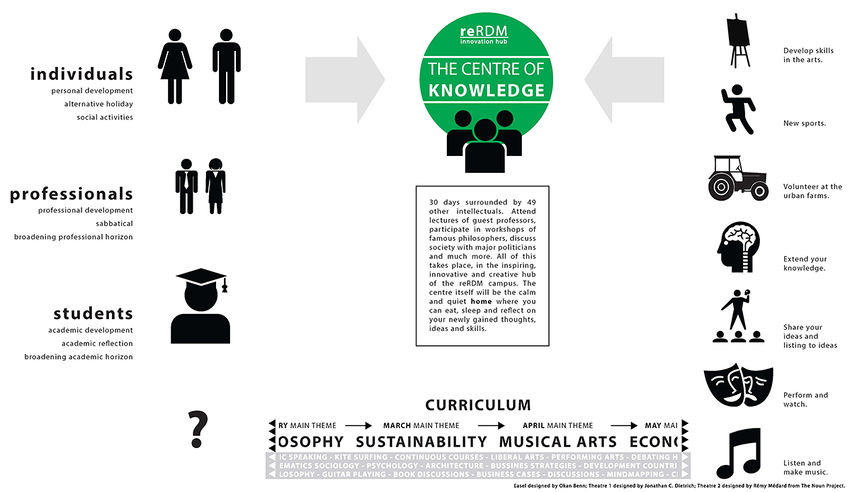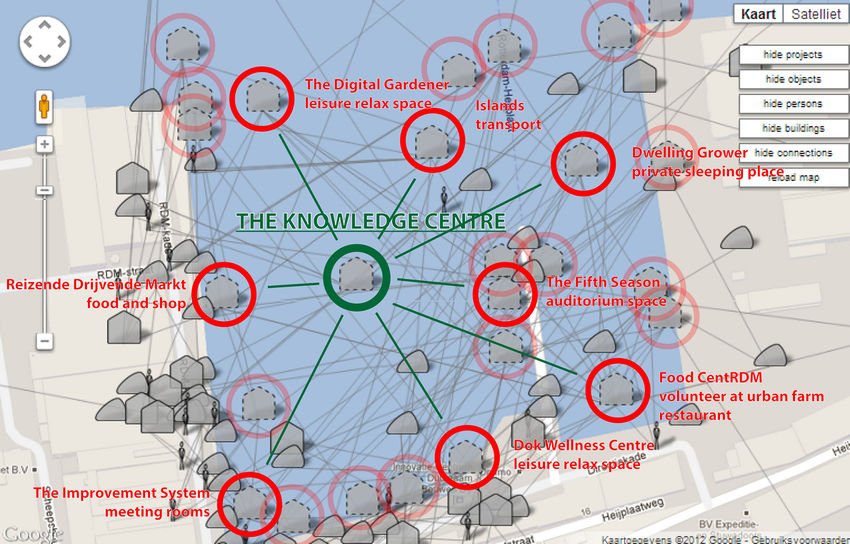project13:Interactions
Contents |
Introducing the project
This project is not necessarily about just a building. The building is just a tool for the project to be realized. This chapter covers first the proposed program and second the supporting interactions.
The Knowledge Campus
The ReRDM urban plan proposes a unique cultural hub for redevelopment of the area situated around the RDM docks. Some twenty-five unique close grouped projects, each on the cutting edge of construction methods, sustainability and culture. All these projects supply a wide range of activities. For instance, an innovative urban farm, different galleries exploring new spacious possibilities, libraries, floating markets and hotel rooms, multi-functional lecture halls, moving bridges, unique recreation areas like an underwater pool and a vertically stacked park, etc. All these projects have something in common: stimulating, motivating and educating visitors.
That is why this project proposes a new sort of commercial activity for this site. This project proposes the site as the Knowledge Campus (i.e. RDM Campus, on the website both names are used).
Developments in society
Nowadays, privately and publically organized lectures of all sorts are getting more and more popular. Just think of the success of the Lowlands University initiative of Lowlands (the biggest Dutch music festival) or the DWDD University initiated by Matthijs van Nieuwkerk (most frequently watched dutch talkshow). Everybody wants to learn always. More educational books are read – in spare time – every day. People want to learn and develop themselves during their complete lives. The Knowledge Campus will be a university. In India, there are hotels which are not quite hotels. They are gatherings, they are movements. People stay there who think alike. Every year guests are staying there for some period of time. They pray together, they eat together, but most of all, they talk together. They discuss, they debate, they share, they think, they learn. Those places are called ashrams. Everybody knows that Steve Jobs went to an Indian ashram, just before his Apple success. Everybody knows that the Beatles spent months in an Indian ashram writing new music. This project is not about recreating an ashram, but it is about creating an environment similar to an ashram. A place where people not only stay, but where people stay together. Where people learn, not only through courses offered by the university, but also through sharing, talking and discussing with other guests. The Knowledge Campus will be a university hotel for educational holidays.
How does it work?
The Knowledge Campus is an open university at the RDM Campus. Guests are offered to stay at the campus for a period ranging from a couple days up to a month. During these days the guests are able to attend lectures, workshops, classes, etc. These activities are organized spread over the campus. The remaining time, the campus offers lots of possibilities to relax, to be entertained, to entertain, to eat, etc. Everything you can image is available at the campus. Different educational programs are organized, they will range from single events, to fulltime courses which will take up one month. Every subject is possible: from philosophy to political science, from sustainable engineering towards learning how to play the violin. Guests will be surrounded by other eager to learn and curious guests. After their stay, the guests re-enter society with a broadened perspective, new knowledge and new motivation.
To support the program content, the Knowledge Campus will not only work together with all the different projects of the RDM site, it will also work with major educational institutions in the near area. For instance the Erasmus University of Rotterdam and the University of Technology in Delft.
Who will be the target group?
As you can imagine, offering a program like this will not be cheap. That is why the Knowledge Campus focuses on three different target groups. The first group pays the regular tariff. Part of this group are retirees, employees whose employer would like to invest in her of his development and other reasonably wealthier people. Different programs of different tariffs are offered: in this way guests do not have to be extremely wealthy to attend. The second group is all about intellectual exchange: if you bring knowledge in, you will receive knowledge in return. Teachers, professors, volunteers and other people who are part of the curriculum, will also benefit from other courses offered by the Knowledge Campus. And, last but not least, the third group will consist of people who applied for scholarships. Most of them will be young people who logically do not have access to large sums of money.
[interaction things for each target group]
Future development
If a consistent stream of intellectual and creative people will attend the centre there are extra possibilities in the future. By hosting sponsored themes (referred to as business cases) or themes with a clear good societal impact extra funds could be raised.
So, what is the building about?
As mentioned in the introduction, the building is a tool for the project to succeed. It is a representational place where all the available activities from around the campus come together. An interactive and confronting architectural structure which does not lay itself upon the visitor, but stimulates the development of his or her ideas about and to reflect upon themselves, society, philosophy, economics, politics and moral and value questions. The place will have characteristics of present day functions in common like: meditation centre, cathedral, monastery, university, social club, bar/restaurant, theatre, hotel, public park, library, museum, monument, fair, palace, etc. The people visiting the Knowledge Campus meet, stay, relax, talk, eat, discuss, think and sleep. The building is the home of the guests of the Knowledge Campus. It is the Knowledge Centre.
Knowledge Campus
The Knowledge Centre interacts with the other places around the Knowledge Campus (i.e. RDM Campus). These interactions can be divided in different sorts based on the functional relationship. Certain projects just offer a place to relax, others offer lecture halls, workshop areas and other education supportive spaces. Therefore the interactions are divided in the following groups: education, primary needs, transport and other activities (primarily leisure). Due to the project of the Knowledge Campus, almost every other project is interacted with. In the end, almost every projects can somehow attribute to multiple groups, only the main interaction is chosen for each.
Education:
- The Fifth Season - auditorium space;
- SEPAC – office area;
- De Geleerde Netwerk – library and workshop space;
- Rejuvenative Sandwich – lecture hall;
- Welcome to the Cave – workshop area;
- Water Morphs – education;
- Connecting Dots – office area;
- DOK_Expo_2.0 – workshop area;
- EZ-RDM – office area;
Basic Needs:
- Veni Vidi – hotel rooms in case the Knowledge Centre is fully booked (besides, it can also serve as a floating workshop space);
- Reizende Drijvende Markt – food supply;
- Vfood restaurant – food supply;
- Open House – appartments in case the Knowledge Centre is fully booked (besides, it can also serve as a temporary workshop space);
Transport:
- Transport Hub – from and to RDM Campus transportation;
- Islands – transportation within campus;
Other activities:
- Food CentRDM – volunteering in urban farming;
- Babel Tower – meditation;
- Variations – leisure;
- Interactive park – leisure;
- Lusthof – leisure;
- The Digital Gardener – leisure and volunteering in park maintenance;
- Floating Theatre – entertainment (besides, also a place where courses can take place)
- Continuality – leisure;
- Interactive park – leisure;
The Knowledge Centre
As stated above, the Knowledge Centre will answer to the need for a home of the monthly Knowledge Centre guests. This home provides space for a range of activities, regular home-related activities like sleeping, eating and relaxing, but also informal program-related activities like discussing, meeting and reflecting. The second part of these activities will be stimulated through the architectural design. The places for sleeping, eating and relaxing should be placed in a way that stimulates interaction while shifting from one to the other. The rooms should be placed like a village design, thus stimulating casual and coincidental meetings and providing public spaces of various sizes to have informal discussions and meetings.
Concluding, the Knowledge Centre will cover following activities:
General service functions:
- Administration desk;
- Small offices;
Different spaces for courses, thinking, talking, gathering and discussing;
- Assembly hall;
- Secondary workshop spaces;
- Library;
- Informal seating arrangements;
Hotel functions:
- Sleeping;
- Hygiene;
- Relaxing;
- Eating;
Service functions:
- Laundry;
- Deliveries area;
Other;
- Infrastructure / Entrance;
- Climate systems area;

